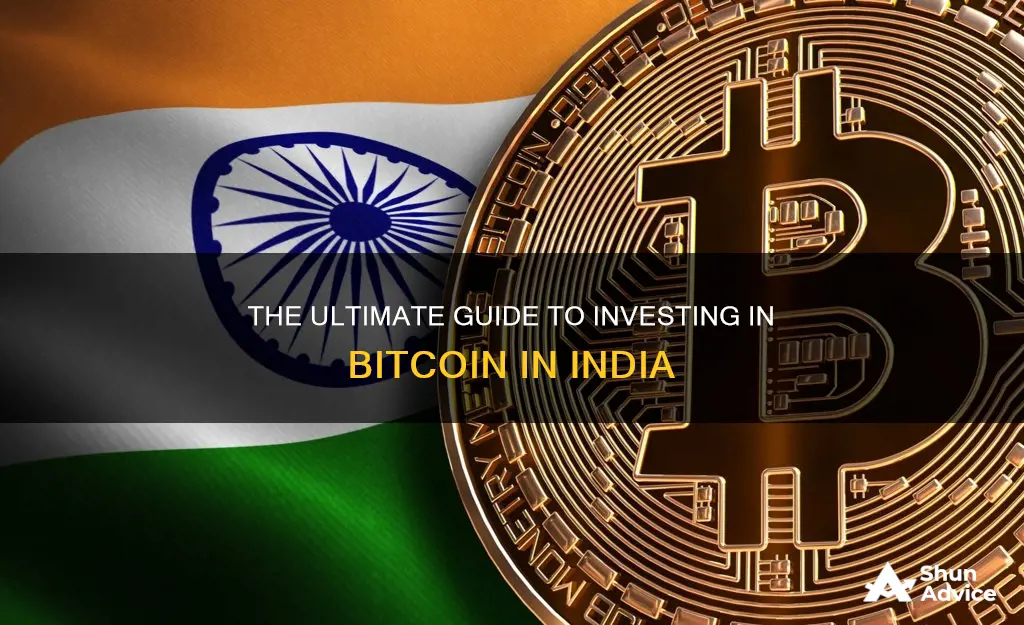
Bitcoin is a highly sought-after cryptocurrency, and its value has skyrocketed since its launch in 2009. While it has experienced both meteoric highs and devastating lows, it remains a popular investment option. In India, investors can legally purchase Bitcoin through cryptocurrency exchange platforms registered with the Financial Intelligence Unit India, such as CoinDCX, CoinSwitch, Mudrex, and WazirX. These platforms offer user-friendly interfaces, extensive support for BTC trading pairs, and competitive trading fees. Before investing, individuals must complete the KYC process and provide essential documents, including the Aadhaar Card and PAN card. They can then place an order, transfer funds from their bank accounts, and securely store their Bitcoin in a cryptocurrency wallet. It is important to note that the Indian market for Bitcoin is still evolving, and RBI has not made it legal, so there is a risk of losing capital.
| Characteristics | Values |
|---|---|
| Legality in India | Legal |
| Minimum investment | No defined minimum amount |
| Payment methods | Bank transfers, RTGS, NEFT, debit/credit cards, net banking, Mobikwik, UPI, cryptocurrency wallet |
| Cryptocurrency exchanges | Binance, CoinDCX, CoinSwitch, Mudrex, WazirX, ZebPay, Coinbase, Unocoin |
| Cryptocurrency wallets | Hot wallets, cold wallets |
What You'll Learn

How to buy Bitcoin in India legally
Bitcoin is a decentralised digital currency with no physical form and no government or regulatory body overseeing its circulation. While it is not considered legal tender in India, it is also not illegal to hold or transact in Bitcoins in the country.
If you want to buy Bitcoin in India, you can do so through various online exchanges such as CoinDCX, ZebPay, Mudrex, WazirX, and CoinSwitch. These platforms allow you to purchase Bitcoin at the current market price and offer different payment methods, including bank transfers, net banking, Mobikwik, cryptocurrency wallets, or UPI. It is important to note that you will need to complete a Know Your Customer (KYC) verification process and provide documents such as your PAN card, address proof, and photographs in the prescribed format.
- Choose a Crypto Exchange: Select a user-friendly, secure, and reputable platform that offers low fees and extensive support for BTC trading pairs. Examples include CoinDCX, Mudrex, Unocoin, ZebPay, and WazirX.
- Decide on a Payment Option: Fund your account using the available payment methods, such as bank transfers, net banking, Mobikwik, cryptocurrency wallets, or UPI. Different platforms may charge varying transaction fees for specific funding options, so consider this when making your decision.
- Place Your Order: Once your account is funded, place your first order to buy Bitcoin. Depending on the platform, you may need to tap a button or enter Bitcoin's ticker symbol (BTC) and the amount you want to invest.
- Select a Safe Storage Option: You can store your Bitcoin in the integrated wallet provided by the crypto exchange or choose a third-party crypto wallet. If you opt for a third-party wallet, ensure it is secure and that you do not lose the private key, as this may result in permanently losing access to your coins.
It is important to remember that investing in Bitcoin comes with risks. The market is highly volatile, and there is always the possibility of losing your capital. Therefore, it is recommended that you do your research, understand the risks involved, and invest only a small percentage of your money in Bitcoin.
A Beginner's Guide: Investing in Bitcoin Gold in India
You may want to see also

Payment options for buying Bitcoin
When it comes to purchasing Bitcoin in India, there are several payment options available. Here is a detailed guide to help you understand the different payment methods:
Bank Transfers
The most common method of buying Bitcoin in India is through bank transfers. You can use your online banking credentials to transfer funds directly from your bank account to the chosen cryptocurrency exchange, such as CoinDCX or WazirX. This method is widely accepted and offers a convenient way to fund your account.
Net Banking
Net banking allows you to make payments directly from your bank account without requiring any additional steps. It is a secure and fast option for buying Bitcoin on cryptocurrency exchanges.
Unified Payments Interface (UPI)
UPI is a popular payment system in India that enables users to transfer funds between bank accounts using a virtual payment address. It is integrated with several cryptocurrency exchanges, providing a seamless and instant way to purchase Bitcoin.
Cryptocurrency Wallets
If you already own other cryptocurrencies, you can use your cryptocurrency wallet to fund your account and buy Bitcoin. This method eliminates the need for fiat currency transactions and allows for quick and easy transfers between different cryptocurrencies.
Debit/Credit Cards
For those who prefer using cards, some cryptocurrency exchanges, like Binance, accept debit and credit cards for purchasing Bitcoin. This option is particularly convenient for new users as it doesn't require additional steps for funding your account.
Third-Party Payment Channels
Binance also offers the option of using third-party payment channels, such as Google Pay or Apple Pay, to purchase Bitcoin. These methods provide flexibility and convenience, especially for users who frequently utilise these payment platforms.
Peer-to-Peer (P2P) Transactions
P2P transactions enable direct crypto transactions between individuals. You can use on-exchange or off-exchange methods for P2P trading. On-exchange methods involve using a P2P service on a crypto exchange platform, while off-exchange methods require finding a trusted buyer or seller through personal networks or OTC brokers. Payment for P2P transactions can be made via bank transfers, digital wallets, or other modes preferred by the seller.
It is important to note that the availability of these payment options may vary depending on the chosen cryptocurrency exchange. Each platform has its own set of accepted payment methods, and it is essential to review their terms and conditions before proceeding. Additionally, transaction fees may differ based on the selected payment option, so it is advisable to consider these charges when deciding on a payment method.
Investing in Dogecoin: How Much Money Is Needed?
You may want to see also

Storing Bitcoin securely
Types of Wallets
Bitcoin can be stored in up to four different types of wallets: mobile, desktop, web, and hardware. These wallets can be categorised into two main types: hot wallets and cold wallets.
- Hot Wallets: These are internet-connected wallets, typically stored on a mobile device or computer. They are easily accessible and convenient for spending and receiving Bitcoin. However, they are more vulnerable to hacking and malware attacks. Examples include mobile, desktop, and web-based wallets.
- Cold Wallets: Cold wallets are offline wallets, providing a higher level of security by not being connected to the internet. They are ideal for long-term storage and holding a large portion of your Bitcoin. Examples include hardware, paper, and coin wallets.
Best Practices for Secure Storage
- Use a Secure Wallet: Opt for a well-known and trusted Bitcoin wallet with strong security features and encryption. Examples include Ledger Nano X and Trezor Model T.
- Backup Your Wallet: Regularly back up your entire wallet, including private keys, to multiple secure locations like CDs, USB sticks, and hard drives.
- Use Strong Passwords: Protect your Bitcoin with strong, unique passwords that are at least 16 characters long and include a mix of letters, numbers, and punctuation marks.
- Store Your Password Securely: Keep a paper copy of your password in a safe or secure location. Alternatively, memorise your password or store it in an encrypted password manager.
- Enable Two-Factor Authentication (2FA): Set up 2FA to add an extra layer of security when accessing your Bitcoin account. Avoid using your primary phone number for 2FA codes, as this can be more vulnerable to hijacking.
- Keep Software Updated: Regularly update your wallet software and operating system to patch security vulnerabilities and enhance protection.
- Use Antivirus Software: Install antivirus software on any device that contains Bitcoin to detect and remove malware that could steal your cryptocurrency.
- Avoid Oversharing: Refrain from sharing personal information, such as your email address, home address, or phone number, on social media or other public platforms.
- Secure Your Network Connection: When accessing your Bitcoin, use a private and secure network instead of public Wi-Fi. If using public Wi-Fi, connect to a VPN to encrypt your web activity.
- Be Cautious of Scams: Be wary of phishing emails, fake giveaways, and other scams aimed at stealing your Bitcoin.
- Double-Check Addresses: Before sending Bitcoin to another wallet, double-check the recipient's address to ensure it is correct and minimise the risk of sending it to the wrong address.
- Use Smaller Transactions: When sending large amounts of Bitcoin, consider breaking it down into smaller transactions to ensure they are working correctly and reduce potential losses.
Additional Tips
- Use Multiple Wallets: Consider using two separate wallets: a hot wallet for everyday spending and a cold wallet for long-term storage and the majority of your Bitcoin.
- Don't Keep All Your Bitcoin in One Place: Diversify your storage by using multiple secure wallets to reduce the risk of losing all your Bitcoin in a single incident.
- Be Discrete: While you can share that you've invested in Bitcoin, avoid disclosing the exact amount you've invested or gained to avoid attracting thieves.
By following these guidelines and staying vigilant, you can significantly enhance the security of your Bitcoin and protect your investment.
A Beginner's Guide to Investing in Bitcoin in India
You may want to see also

How to sell Bitcoin
India is one of the biggest Bitcoin arbitrage opportunities for Bitcoiners around the world. With a price difference of more than $100, one can easily earn a fortune. Here is a step-by-step guide on how you can sell Bitcoin in India:
Step 1: Choose a Crypto Exchange
First, you need to select a cryptocurrency exchange platform that is registered with the Financial Intelligence Unit India. Some of the top exchanges in India include:
- CoinDCX
- CoinSwitch
- Mudrex
- WazirX
- Unocoin
- ZebPay
Step 2: Create an Account
Once you have chosen an exchange, sign up and create your account. This usually involves providing an email address or phone number, verifying your identity, and agreeing to the terms and conditions.
Step 3: Deposit Bitcoin
Next, you will need to deposit your Bitcoin into your account on the exchange. This typically involves copying the address provided by the exchange and pasting it into your external Bitcoin wallet. Double-check the address before sending the BTC.
Step 4: Sell Bitcoin
After depositing your Bitcoin, you can sell it on the exchange. You can choose to sell your BTC for fiat currency or other cryptocurrencies. There are a few different ways to sell, including instant sell, market order, and limit order. Instant sell options tend to have higher fees, while market and limit orders may offer lower fees but take longer to process.
Step 5: Withdraw Funds
Once you have sold your Bitcoin, you can withdraw your funds. Depending on the exchange, you may be able to withdraw directly to your bank account or through other methods such as UPI or net banking. Keep in mind that some exchanges may have holding periods or withdrawal fees.
It is important to note that selling Bitcoin may have tax implications. When you sell your BTC and make a profit, you may be subject to capital gains taxes, and you will need to report your cryptocurrency sales on your taxes.
Exploring Corporate Bitcoin Investments: Who's In?
You may want to see also

Avoiding scams when investing in Bitcoin
When investing in Bitcoin, it's important to be vigilant and aware of potential scams to protect your financial assets. Here are some guidelines to help you avoid common Bitcoin scams:
Do Your Research:
Before investing in any cryptocurrency, it's crucial to conduct thorough research. Understand the overall scenario of the global and Indian crypto markets. Track the price movements of digital coins and Bitcoin's market share. Stay informed about the latest developments and updates in the industry.
Choose Reputable Platforms:
Always use well-known and trusted cryptocurrency exchanges, such as CoinDCX, ZebPay, or Coinbase. These platforms have a large user base and are recognised for their security measures. Avoid lesser-known websites or platforms that offer unrealistic returns or discounts.
Secure Your Wallet:
Use a secure crypto wallet to store your Bitcoin. There are two types of wallets: cold wallets and hot wallets. Cold wallets store your private keys offline, providing a higher level of security. Hot wallets are connected to the internet and are more convenient for transactions. Choose a wallet that suits your needs and prioritises security.
Beware of Scammers:
Be cautious of individuals or organisations posing as trusted entities, such as government agencies, celebrities, or investment managers. Do not divulge your private keys or send cryptocurrency to anyone, no matter how convincing they may seem. Be especially wary of unsolicited contact and requests for your private information.
Recognise Red Flags:
Be alert for common signs of scams, such as promises of guaranteed or excessive profits, high-pressure sales tactics, or demands to act immediately. If something seems too good to be true, it probably is. Always take your time and never feel pressured to make impulsive decisions.
Practice Safe Online Behaviour:
Avoid clicking on suspicious links or attachments in emails or text messages. Be cautious of phishing attempts, where scammers impersonate legitimate companies or organisations. Always verify the authenticity of any website or platform before providing your personal or financial information.
Diversify Your Investments:
As the old adage goes, "Don't put all your eggs in one basket." Diversifying your investments across different asset classes and cryptocurrencies can help reduce the risk of losing all your money in a single scam. Remember that Bitcoin is a highly volatile investment.
Stay Informed About Scams:
Keep yourself updated about the latest scam tactics by following official consumer protection sites and channels, such as the FTC, FBI, and SEC. Stay informed about new scam attempts and protect yourself by recognising the warning signs.
Report Scams and Seek Help:
If you suspect or encounter a scam, report it to the relevant authorities and consumer protection agencies. You can file reports with the Federal Trade Commission (FTC), Securities and Exchange Commission (SEC), Commodity Futures Trading Commission (CFTC), or the Internet Crime Complaint Center (IC3). Additionally, consider reaching out to the media to raise awareness and help prevent others from falling victim.
Be Wary of Unsolicited Offers:
Be cautious of any unsolicited contact or offers regarding your crypto assets. Scammers may pose as customer support, investment managers, or even romantic interests to gain your trust. Do not respond to these communications and independently verify any contact information before initiating contact.
Enable Two-Factor Authentication:
Add an extra layer of security to your crypto accounts by enabling two-factor authentication. This will make it more difficult for scammers to access your accounts, even if they have your password. Use a secure method for receiving authentication codes, such as an authenticator app, rather than SMS or email.
Educate Yourself:
Invest in your financial education by learning about the blockchain technology underlying Bitcoin and other cryptocurrencies. Understand the basics of how the technology works, how to securely store your assets, and the potential risks and scams in the crypto space. Knowledge is your best defence against scammers.
In conclusion, while investing in Bitcoin carries inherent risks, you can significantly improve your financial security by being vigilant, informed, and cautious. Stay alert, do your research, and only invest what you can afford to lose. Remember that if something seems too good to be true, it probably is.
Young Investors: A Guide to Bitcoin Before 18
You may want to see also







